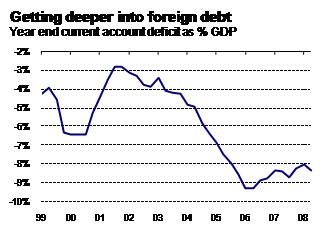Borrow and hope
In a world increasingly wary of debt New Zealand is vulnerable, possibly very vulnerable. We are one of the most indebted nations in the developed world with net foreign debt hovering around 100% of GDP. As a country we have been chalking up external account deficits for 35 years and now have an IOU bill to the rest of the world of around $160bn, or about $40,000 for every New Zealander. We are not the most indebted, but we are exceeded only by Iceland whose net foreign debt per head is a massive $100,000. But then Iceland is now virtually bankrupt.
Not since 1973 has New Zealand earned more from the world than we have spent buying goods and services (imports) and paying dividends to foreign owners of many of our businesses.

The annual cost of servicing the accumulated external deficits is now around $14bn, with a large proportion of that debt servicing bill being in the form of dividend payments to foreigners who have bought our businesses. Essentially we’ve been pawning our businesses (including farms) to finance a life style we haven’t really been able to justify. Or, put another way, we have mortgaged our asset base to fund day-to-day consumption of imports.
Our slide into debt began with the first oil crisis as governments borrowed first to cushion the effects of the crisis (borrow and hope) and then to invest our way out of the problem (Muldoon’s flawed Think Big programme).
In the mid 1980s the government floated the currency, freed up financial markets and left the private sector to take on whatever debt was required. Since then the government has used the proceeds of state assets sales to reduce its net foreign debt position, which fell to around zero by 1996.
What is surprising is just how much foreign debt New Zealand has been allowed to amass given our obvious lack of acumen in using it to lift our export earnings. The inflow of foreign capital, which was largely channelled into property, pushed up the currency scuppering export profitability and in some cases forcing exporters out of business or offshore. The legacy has been a stack of foreign debt (fortunately denominated in New Zealand dollars) and a battered export sector.
Despite the cavalier way in which we have used other people’s savings the sky appears not to have fallen in. But the risk of it doing so has just risen in two important ways. The world financial crisis is making it a lot more difficult for delinquent borrowers to roll over existing credit facilities. Secondly, a worldwide recession has sunk our chances of exporting our way out of trouble.
Our stock of net foreign debt is held almost entirely by the private sector. But it is not solely a function of business borrowing, although many businesses have been sold to foreigners who have structured their purchases using a substantial dose of debt. In that sense a significant portion of our foreign debt is in fact owed by foreign owned companies operating in New Zealand.
One of the biggest bulges in foreign borrowing over the past decade has been led by the major trading banks tapping into New Zealand denominated foreign retail bond markets. Rather than limiting mortgage lending to their domestic deposit base, banks have helped themselves to the savings of Japanese housewives and Belgian dentists. There is currently around $57bn of Uridashi and Eurokiwi bonds on issue.
The doubling in house prices over the six years ended 2007 looks dangerously dependent on the willingness of these foreign savers to keep investing in New Zealand denominated bonds. Given the recent sharp fall in the New Zealand dollar these savers are about to reap a big loss (in some cases more than 20%) on their three-year investment. That will stunt their enthusiasm for rolling over these bonds. If that happens, banks will be starved of funding and the credit crunch could get a lot worse yet.
Banks of course were eager to persuade households, farmers and businesses to take up the foreign-backed credit. People gorged themselves on it, buying holiday homes or sections, adding a boat, or a car, and in some cases a business to their mortgages. But banks are now in the process of reeling in that credit and that is driving heavily indebted households and business to the wall. That process has a while to run yet.
One of the biggest challenges the new government faces is managing the aggressive unwinding of debt that is now underway. The focus to date has been on cushioning the personal effects of this process as politicians have been desperate to win favour with voters. But the harsh reality is that New Zealanders must earn more foreign income or slash what we spend – foreign savers are going to be a whole lot less keen to keep extending us the credit to finance our spending. Fasten your safety belts for a much lower currency and/or higher interest rates. Debt and deficits really do matter when people and institutions become scared to lend, especially to those who appear to have squandered the debt.




